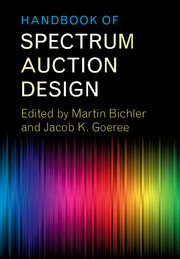Book contents
- Frontmatter
- Contents
- List of Contributors
- Preface
- List of Papers
- Part I The Simultaneous Multiple-Round Auction
- Part II The Combinatorial Clock Auction Designs
- 5 Combinatorial Auction Design
- 6 The Clock-Proxy Auction: A Practical Combinatorial Auction Design
- 7 Spectrum Auction Design
- 8 A Practical Guide to the Combinatorial Clock Auction
- 9 Market Design and the Evolution of the Combinatorial Clock Auction
- 10 Quadratic Core-Selecting Payment Rules for Combinatorial Auctions
- 11 Core-Selecting Package Auctions
- 12 A New Payment Rule for Core-Selecting Package Auctions
- 13 On the Impossibility of Core-Selecting Auctions
- 14 Ascending Combinatorial Auctions with Risk Averse Bidders
- 15 Properties of the Combinatorial Clock Auction
- 16 Budget Constraints in Combinatorial Clock Auctions
- 17 (Un)expected Bidder Behavior in Spectrum Auctions: About Inconsistent Bidding and its Impact on Efficiency in the Combinatorial Clock Auction
- Part III Alternative Auction Designs
- Part IV Experimental Comparisons of Auction Designs
- Part V The Bidders’ Perspective
- Part VI Secondary Markets and Exchanges
- Outlook
- References
16 - Budget Constraints in Combinatorial Clock Auctions
from Part II - The Combinatorial Clock Auction Designs
Published online by Cambridge University Press: 26 October 2017
- Frontmatter
- Contents
- List of Contributors
- Preface
- List of Papers
- Part I The Simultaneous Multiple-Round Auction
- Part II The Combinatorial Clock Auction Designs
- 5 Combinatorial Auction Design
- 6 The Clock-Proxy Auction: A Practical Combinatorial Auction Design
- 7 Spectrum Auction Design
- 8 A Practical Guide to the Combinatorial Clock Auction
- 9 Market Design and the Evolution of the Combinatorial Clock Auction
- 10 Quadratic Core-Selecting Payment Rules for Combinatorial Auctions
- 11 Core-Selecting Package Auctions
- 12 A New Payment Rule for Core-Selecting Package Auctions
- 13 On the Impossibility of Core-Selecting Auctions
- 14 Ascending Combinatorial Auctions with Risk Averse Bidders
- 15 Properties of the Combinatorial Clock Auction
- 16 Budget Constraints in Combinatorial Clock Auctions
- 17 (Un)expected Bidder Behavior in Spectrum Auctions: About Inconsistent Bidding and its Impact on Efficiency in the Combinatorial Clock Auction
- Part III Alternative Auction Designs
- Part IV Experimental Comparisons of Auction Designs
- Part V The Bidders’ Perspective
- Part VI Secondary Markets and Exchanges
- Outlook
- References
Summary
Introduction
Combinatorial Clock Auctions (CCAs) are multi-object auctions where bidders make package bids in a clock phase followed by a supplementary round. CCAs have been recently used around the world to allocate spectrum frequencies for mobile telecommunication purposes. CCAs were introduced by Ausubel et al. (2006) and are the subject of quite a few recent investigations (see, e.g., Ausubel and Baranov, 2014; Bichler et al., 2013; Janssen and Karamychev, 2016; Knapek and Wambach, 2012; Levin and Skrzypacz, 2016; and papers in this volume).
One of the issues that is under-explored in the literature on CCAs is the impact of budget constraints on the bidding behavior of participating bidders and, consequently, on the efficiency properties of the auction. It is difficult to obtain direct evidence of the fact that budget constraints play an important role in real-life CCAs. It is also difficult to believe, however, that bidders in recent spectrum auctions have not been financially constrained. The amount of money typically paid is in the billions of euros, and even though a firm may think it will earn that money back in the years after the auction, it is likely to have to borrow the money in one way or another. Also, casual empiricism suggests that share prices of companies participating in a long-lasting auction decline during and after the auction (cf. the share prices of KPN in the Netherlands in 2012 and A1 in Austria in 2013).
It can be useful to distinguish between hard and soft budget constraints. On one hand, a hard budget constraint implies that bidders cannot pay more than a certain exogenously determined amount of money. On the other hand, senior management can set a soft budget constraint and inform the company's bidding team that it is not allowed to spend more than a certain amount of money. That is, under soft budget constraints, senior management may set aside a certain amount of money to be invested in acquiring spectrum.
- Type
- Chapter
- Information
- Handbook of Spectrum Auction Design , pp. 318 - 337Publisher: Cambridge University PressPrint publication year: 2017
References
- 2
- Cited by



